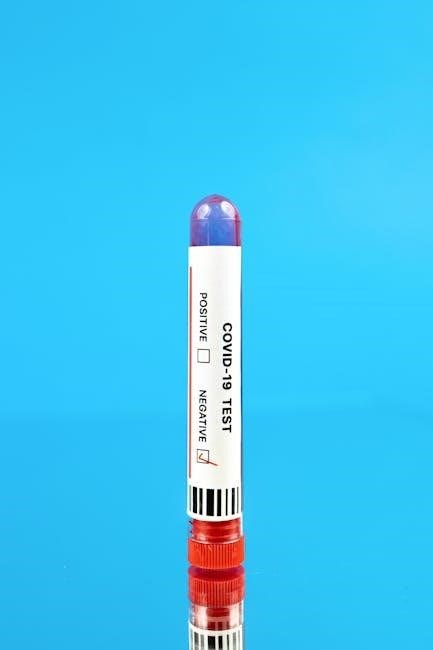Understanding fake positive covid results requires knowledge of testing methods and
lab
procedures to avoid misinterpretation of results from cvs and other providers always using accurate information from reliable sources online.
Understanding the Concept of Fake Positive Covid Results
To comprehend the concept of fake positive covid results‚ it is essential to delve into the world of covid testing and its intricacies‚ including the role of providers like cvs in administering these tests. The internet is filled with information on this topic‚ including pdf documents that outline the procedures for covid testing. Understanding the concept of fake positive covid results requires a thorough analysis of the testing methods and procedures used by providers like cvs. This includes examining the types of tests used‚ such as PCR and antigen tests‚ and the criteria used to determine a positive result. By exploring the concept of fake positive covid results‚ individuals can gain a better understanding of the complexities involved in covid testing and the importance of accurate results. This knowledge can help individuals make informed decisions about their health and well-being. The concept of fake positive covid results is multifaceted and requires careful consideration of various factors.

CVS Covid Test Results Template
Cvs provides a template for covid test results‚ including a pdf document that outlines the test procedure and results‚ using a standard format for easy understanding and record-keeping purposes always.
Features of the Template
The template provided by cvs for covid test results includes several key features‚ such as a pre-designed format for recording test results‚ including the individual’s personal information‚ test date‚ test method‚ and contact details. The template is available in pdf format‚ making it easily accessible and printable. It also includes a section for noting the test results‚ including whether the result is positive or negative‚ and any additional comments or notes from the healthcare provider. The template is designed to be easy to read and understand‚ with clear headings and sections‚ making it simple for individuals to review and understand their test results. Additionally‚ the template can be used to record multiple test results‚ making it a useful tool for tracking and monitoring covid test results over time. The template is also compatible with various devices and operating systems‚ allowing individuals to access and print their test results from anywhere.

Interpreting Covid Test Results
Understanding covid test results from cvs requires reviewing the
test
report carefully and considering factors that may affect accuracy always using online resources for guidance and support and information.
Understanding False Positives and Test Accuracy
False positives can occur with covid tests‚ including those from cvs‚ and it is essential to understand the factors that contribute to these errors. The accuracy of covid tests can be affected by various elements‚ such as the type of test used‚ the quality of the sample‚ and the laboratory procedures. According to online resources‚ false positives can be caused by cross-reactivity with other viruses or contaminants in the sample. Additionally‚ the sensitivity and specificity of the test can also impact the accuracy of the results. It is crucial to review the test report carefully and consider the clinical context in which the test was performed. By understanding the potential for false positives and the factors that affect test accuracy‚ individuals can make informed decisions about their health and take appropriate actions. This knowledge can also help to reduce anxiety and uncertainty related to covid test results from cvs and other providers.

Covid Test Types and Retesting
Various covid test types‚ including PCR and antigen tests‚ are available from providers like cvs‚ with retesting options depending on initial results and clinical guidelines always using online resources for guidance.
PCR and Antigen Tests
PCR and antigen tests are two common types of covid tests used to detect the presence of the virus. PCR tests‚ also known as molecular tests‚ detect the genetic material of the virus and are considered highly accurate. Antigen tests‚ on the other hand‚ detect proteins on the surface of the virus and are often used for rapid testing. Both types of tests have their own advantages and disadvantages‚ and the choice of test depends on various factors‚ including the purpose of the test‚ the population being tested‚ and the resources available. According to online resources‚ PCR tests are generally more sensitive than antigen tests‚ but antigen tests are faster and more convenient. Understanding the differences between PCR and antigen tests is essential for interpreting test results and making informed decisions about retesting and treatment. The Centers for Disease Control and Prevention provide guidance on the use of PCR and antigen tests for covid diagnosis.

Insurance Coverage for Covid Home Tests
Individual insurers make coverage decisions based on plan designs and client needs using online resources and information from providers like cvs to determine eligibility for reimbursement.
Eligibility and Coverage Decisions
Insurance companies determine eligibility for covid home test coverage based on individual plan designs and client needs‚ using online resources and information from providers like cvs.
The federal government’s announcement regarding the public health emergency has given insurers more flexibility in making coverage decisions.
Customers should check with their insurer to determine eligibility for at-home tests‚ as coverage decisions may vary.
At-home covid-19 tests are excluded from coupon discounts and promotions‚ including rewards programs.
Insurers consider various factors when making coverage decisions‚ including the type of test‚ testing frequency‚ and individual health needs.
Online resources and provider information help insurers make informed decisions about coverage and reimbursement.
Eligibility and coverage decisions are made on a case-by-case basis‚ taking into account the specific needs and circumstances of each client.
Insurers may require additional information or documentation to determine eligibility for coverage.
Clients should review their insurance policies and consult with their insurer to understand their coverage options and eligibility for covid home tests.
Clear communication and transparency are essential in ensuring that clients understand their coverage and eligibility for reimbursement.
